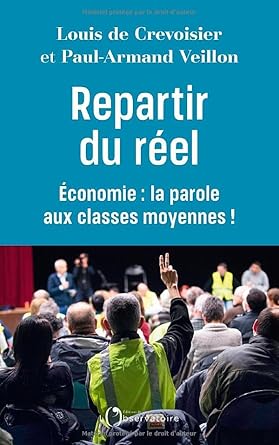“Starting from reality”, a certain touch of arrogance in the title as if it was just necessary to start again and listen to what the “France from below” says to put equity and justice in public policies and reforms. The authors report a certain self-criticism of their peers and what they have lacked until today: understanding the experience of workers, far from the metropolises, public transport and the Grandes Écoles. They drew inspiration from their experiences, the cahiers de doléances and the reports of the great national debate established in 2019, a few months after the start of the yellow vests crisis.
In December 2024, President Emmanuel Macron called, “to govern”, “from reality and not from fantasies or untruths”. The words are clear, but the middle classes are getting impatient.
These middle classes, neither poor nor rich, seek at all costs to have a job that pays, a decent standard of living and hope for their social advancement and that of their children. Starting point of the yellow vests crisis and the mobilizations on the roundabouts. Employees must be able to consider an increase in their wages throughout their career and the social system must be more incentive to work: the gap between inactivity and a job at the minimum wage is considered too small. The authors propose the creation of an “employee dividend” in order to increase the sharing of value.
In an indebted France, the financing of the social model remains a stumbling block between politicians and economists. Solutions exist to support the purchasing power of workers but require courage in implementation: lower public spending, increase social contributions and/or working time, or change the way the pension system works.
Taxes for whom and for what? The middle classes are not against taxes but want value for their money and are not satisfied with the level of public services. Given this, the authors propose to directly link the Court of Auditors to Parliament in order to have a better assessment of public spending. Regarding taxation, it must be more virtuous in order to reward behaviors that contribute to collective interests.
Purchasing power, another theme discussed at length by politicians in search of voters. In a service and deindustrialized France, productivity has been slowing down for several decades and can no longer guarantee dynamic growth. Constrained by their income, the middle classes are eyeing their spending. Among the avenues mentioned for leveraging growth, the authors mention complementary health and highways.
Added to this is the ecological crisis and adaptation to the energy transition. Once again, the middle classes find themselves in difficulty to find decent, isolated housing and are often “strangled” by rising energy costs.
In the last part, the authors highlight the opportunities for the middle classes. In terms of education, the authors wish to strengthen the level of mathematics and encourage students to move towards scientific fields; without forgetting the revaluation of teachers.
At the dawn of future electoral periods and budgeting, the authors thus establish many concrete proposals that must be at the heart of the debates.
An educational and enlightening book, a must read.
Louis DE CREVOISIER is a senior official, Inspector of Finance. He was previously Deputy Director of the Cabinet of the Minister of Transport.
Paul-Armand VEILLON is a senior civil servant, deputy director of the office of the Minister in charge of Public Accounts.
Sophie FRIOT


